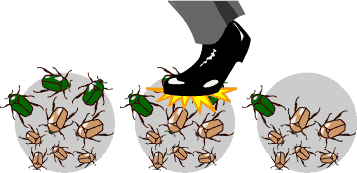No, I think it is not a sample that leads to strong conclusions.
Broader surveys lead to different conclusions. Here is a summary of a recent survey of over 22,000 scientists in 8 different nations:
Source
If we are to draw our conclusions from the religious opinion and practice among biologists and physicists in France, the UK, and the US, then we should eschew the theories of physics and biology that they support. But wait: the scientists in Taiwan and Hong Kong are more religious than the general population in those countries! How did that happen? And scientists in India and Turkey are about as religious as the broader society.
Now let’s take a look at a broader range of scientists from a 2009 Pew survey:
Source
Note that religious belief is less common among physicists and geologists than among biologists and medical researchers.
So if we are throwing out scientific theories based on religious opinion surveys among scientists, let’s be consistent! Good-bye, Big Bang, quantum mechanics, and plate tectonics! You seemed so compelling and well-supported by the evidence, but then I discovered that the majority of scientists who work in your fields of endeavor do not agree with me on religious belief! 
Let’s take a look at two more surveys, both by Edward Larson of the University of Georgia. In 1997, he discovered that about 40% of mathematicians, biologists, physicists, and astronomers
“said they believed in a God who, by the survey’s strict definition, actively communicates with humankind and to whom one may pray ‘in expectation of receiving an answer.’” Source
In 1998 Larson surveyed just “leading” scientists, defined by their membership in the National Academy of Science. This group would be roughly comparable to the group surveyed 15 years later in the research cited by Sandwalk. The 1998 survey revealed a far lower adherence to religious belief and practice than Larson’s 1997 survey. Here are Larson’s own words on the survey result:
Our survey found near universal rejection of the transcendent by NAS natural scientists. Disbelief in God and immortality among NAS biological scientists was 65.2% and 69.0%, respectively, and among NAS physical scientists it was 79.0% and 76.3%. Most of the rest were agnostics on both issues, with few believers. We found the highest percentage of belief among NAS mathematicians (14.3% in God, 15.0% in immortality). Biological scientists had the lowest rate of belief (5.5% in God, 7.1% in immortality), with physicists and astronomers slightly higher (7.5% in God, 7.5% in immortality).
Again, if we are to base our acceptance of scientific theories on the religious beliefs of leading scientists, then we are duty-bound to reject a lot more than evolution.
But should we be accepting/rejecting scientific theories on this basis? The National Academy of Science–the American organization to which leading scientists belong–made an official publication about evolution and religious belief. Here is a one sentence summary in their own words:
The evidence for evolution can be fully compatible with religious faith. Science and religion are different ways of understanding the world. Needlessly placing them in opposition reduces the potential of each to contribute to a better future.
As a Christian, I want my beliefs about God’s world to be guided by God’s Word, rather than opinion surveys of scientists. So I–together with the leadership of the National Academy of Science and 33-40% of the broader American scientific community–agree with the 5% of leading biologists and 7% of leading physicists who who regard faith as compatible with scientific theories and evidence. The other 95% of leading biologists and 93% of leading physicists will have to live–somehow, I’m not sure how they can do it—with our disagreement.
Grace and peace,
Chris Falter

